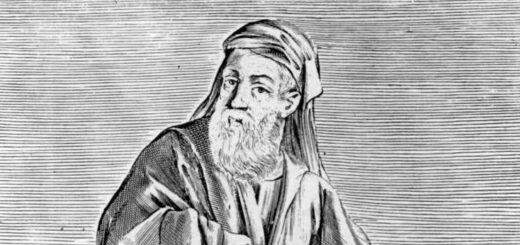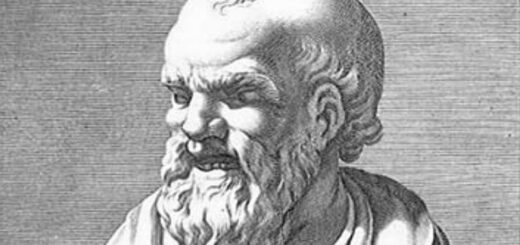The Milesian School of Philosophy and Natural Philosophy
The city of Miletus, located on the eastern coast of the Aegean Sea, is the birthplace of the first school of philosophy in Ancient Greece and, indeed, the entire Western world. The founders and members of this school are already familiar to us: the three wise men of Miletus—Thales, Anaximander, and Anaximenes.
As we know, philosophy opened its eyes here and set its direction. Modern science, especially physics, astronomy, biology, and mathematics, took its first breaths here, breaking through the darkness of centuries to shed light on our present. The cosmos is examined through science—this is the greatest achievement of the Milesian school of philosophy. It was these wise men of Miletus who lifted the dark veil of mythology from the universe and, most importantly, were unafraid to learn, to admit ignorance, and to confront what they did not know.
Ignorance is not frightening; what is truly frightening is the unwillingness to learn, to remain unaware of what one does not know. They asked questions and sought answers.
Why is this important? One of the most famous scientists of his time, the English astrophysicist and cosmologist Stephen Hawking, once said: “The greatest enemy of knowledge is not ignorance; it is the illusion of knowledge[1].”
If we reflect deeply, we will undoubtedly discover how brilliant and yet simple this idea is. To heal, a patient must first recognize their illness. In many cases, humanity fails to learn not because it does not know, but because it mistakenly believes it already does. Such a mindset can even halt the progress of civilizations. One of the primary causes of this belief is myth and mythology, which feed the illusion of knowledge. It was against this very myth and mythology that a few wise individuals raised their voices thousands of years ago, and others have continued the struggle for centuries. This struggle is ongoing even now.
But it should have ended. Why hasn’t it? Bertrand Russell provides a possible answer: “The fundamental cause of the trouble is that in the modern world, the stupid are cocksure while the intelligent are full of doubt. [2]”
As evidence of this mindset, consider Isaac Newton’s words: “I do not know what I may appear to the world, but to myself I seem to have been only like a boy playing on the seashore, and diverting myself in now and then finding a smoother pebble or a prettier shell than ordinary, whilst the great ocean of truth lay all undiscovered before me.”
These words belong to one of history’s greatest minds—a person who discovered the law of universal gravitation, formulated the three laws of motion, and laid the foundations of calculus and optics. And yet, he emphasized that what he knew was but a drop in the ocean.
Now, for a moment, recall the “universal experts” around you. Then draw your own conclusions.
Let us return to Miletus.
As we have seen, the foundation of natural philosophy—what we now call modern natural sciences—was laid at the Milesian school of philosophy.
Miletus was one of the largest and wealthiest cities of Ancient Greece. Herodotus described it as “the jewel of Ionia.” Naturally, this prosperity greatly fostered the development of philosophy. However, this wealth and grandeur lasted only until the mid-6th century BCE. Once again, the irrationality and intellectual limitations of humanity prevailed. The invading armies from the Near East had no interest in uncovering the mysteries of the universe or leaving a mark on history. Those who do not kindle a torch cannot see its light, for seeing requires more than eyes—it demands intelligence and a will to perceive. And perhaps even those are not absolute necessities. Seeing requires both intellect and desire. History has proven this countless times, though proof serves little purpose for those unwilling or unable to see.
In the early 5th century BCE, Miletus was conquered by the Achaemenids, bringing an end to philosophy in Miletus.
Yet, nature and the environment are always one step ahead. Yes, to understand this, one does not need the intellect of Thales, Aristotle, Vesalius, Darwin or Mendel. The proof lies in the pages of history. Creative minds will always create. If such intellect is destroyed in the eastern Aegean, it will inevitably be reborn in the west.
It must indeed be reborn.
And so it happens. In the free cities of Greece, representatives of the Milesian school of philosophy continue their quest to uncover the mysteries of the universe. They search for answers to the fundamental questions of early philosophy. The newborn philosophy matures successfully.
Natural philosophy, or the philosophy of nature, is the study of the world and nature. The aim of this inquiry is to understand nature through intellect and to construct a logical and scientifically grounded picture of the world.
Natural philosophy is the earliest form of what we now know as science. Thus, the Milesian philosophers who laid its foundation were the first scientists. They asked fundamental questions about the origin of existence and sought answers based on logic and observation. As a result, natural philosophy emerged and eventually evolved into modern science.
Until the 19th century, when scientist and historian of philosophy William Whewell coined the terms “science” and “scientist,” practitioners of science were known as natural philosophers, as their work involved the study of nature.
This means that Isaac Newton, who lived twenty-two centuries after Anaximander, was not a physicist by the standards of his time but a natural philosopher. This is why his magnum opus is not called the foundation of physics but rather Mathematical Principles of Natural Philosophy (Philosophiæ Naturalis Principia Mathematica).
Similarly, Nicolaus Copernicus, who laid the groundwork for the first scientific revolution two centuries before Newton, was also a natural philosopher. The cause of this revolution was the Renaissance—a rebirth. But what was being reborn? Ancient science and philosophy.
The Renaissance revived ancient science, culture, and philosophy, leading to the first scientific revolution. Natural and exact sciences began to develop rapidly.
Galileo declared that the book of nature is written in the language of mathematics, with its symbols being triangles, circles, and other geometric figures. Kepler, building on Tycho Brahe’s observations, described the orbital motion of planets around the Sun, improving Copernicus’s heliocentric model. Together with Newton’s laws, Kepler’s and Galileo’s contributions formed the foundation of modern physics and astronomy.
Newton famously said, if I have seen further, it is by standing on the shoulders of giants. Among those giants were Thales, who predicted a solar eclipse; Anaximander, who understood that the Earth does not rest on pillars; Leucippus and Democritus, who discovered the atom; Philolaus, who claimed the Earth was not the center of the universe and was in motion; and, of course, many other wise figures.
This was only the beginning. Vesalius laid the foundation for modern anatomy, Leeuwenhoek for microbiology, and Boyle and Lavoisier for chemistry.
Bacon and Descartes gave the scientific method—whose first stone was laid by Thales—its final form. This method, still in use today, draws an unbroken line between science and pseudoscience, the rational and the irrational. Its core demands—observation and an objective approach to the subject of study—remain the fundamental criteria for validating any theory.
In short, this method marks the starting point of science. And this beginning will not escape our attention, though that is a story for later.
[1] https://hackernoon.com/the-greatest-enemy-of-knowledge-is-not-ignorance-it-is-the-illusion-of-knowledge-6dc94fe3519a
[2] https://russell-j.com/0583TS.HTM


